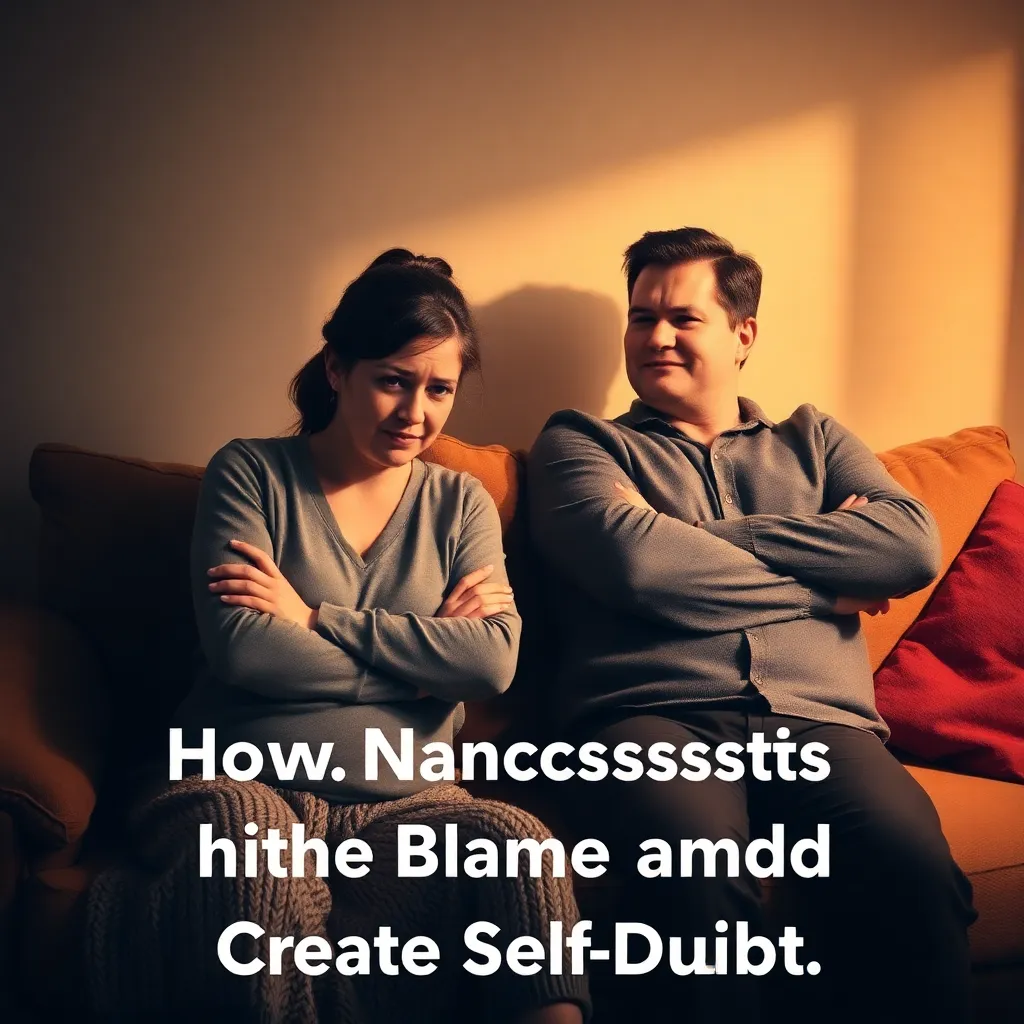Navigating a relationship with a narcissist can feel like walking through a maze of shifting shadows, where blame is a constant companion and self-doubt lurks around every corner. If you’ve ever felt like you’re losing your sense of reality, you are not alone, and it’s crucial to understand that these feelings are not your fault. The insidious tactics used by narcissists to shift blame and create self-doubt can leave even the most grounded individuals questioning their worth and reality.
Understanding these dynamics is not just important; it is essential for reclaiming your peace of mind and emotional well-being. This article will guide you through the subtle and sometimes overt methods narcissists employ to make you doubt yourself, helping you build resilience against these manipulative behaviors. By shining a light on these patterns, you’ll gain the tools needed to protect your self-esteem and foster healthier relationships.
Through this exploration, you’ll learn to recognize the signs of blame-shifting, understand the emotional impact it carries, and develop strategies to counteract these harmful patterns. We aim to empower you with knowledge and practical solutions, fostering a sense of security and self-assurance. Together, we will journey towards a clearer understanding, offering you the support and guidance you need to navigate these challenging relationships with confidence and grace.
1. Recognizing Narcissistic Blame Shifting

In many relationships, it can be challenging to recognize when a partner is subtly manipulating the narrative. When dealing with a narcissist, this manipulation often manifests as **blame shifting**, where they deflect responsibility for issues onto you.
One moment, you might find yourself discussing a minor disagreement, and the next, you’re questioning your entire perspective. This is a classic example of how a narcissist can twist conversations, leaving you feeling **confused** and **doubtful** about your own recollections.
Imagine a scenario where a partner forgets an anniversary but somehow makes you feel guilty for expecting them to remember. By flipping the script, they ensure they never face **accountability**, instead making you feel **overly demanding** or **unreasonable**.
Experts suggest that narcissists often use this tactic to maintain a sense of **control** and **superiority** in the relationship. It’s essential to recognize these patterns early to protect your mental and emotional well-being.
Recognizing these signs is the first step toward reclaiming your **confidence** and **self-worth** in any relationship. By understanding the tactics at play, you empower yourself to set healthier boundaries and seek support if needed.
2. Tactics Used to Erode Confidence

In relationships with narcissists, one common tactic used to erode confidence is **gaslighting**. This involves the narcissist causing you to **question your reality**, making you doubt your perceptions and memories.
Imagine a scenario where you express how certain actions hurt you, only to be told you’re “too sensitive” or “imagining things”. This tactic is intended to **undermine your self-assurance** and make you rely completely on the narcissist’s distorted version of reality.
Another subtle yet powerful tactic is **projection**, where the narcissist attributes their own flaws or wrongdoings onto you. For instance, if they are dishonest, they might accuse you of lying to shift the focus and guilt away from themselves.
Over time, these strategies can lead to a **loss of self-trust** and a feeling of helplessness. It’s crucial to recognize these manipulations and remind yourself of your own truths and experiences.
Expert insights suggest building a **support network** of trusted loved ones who can affirm your experiences. This can provide a much-needed reality check and bolster your confidence against the narcissist’s tactics.
In conclusion, while narcissistic behaviors can be deeply unsettling, recognizing these tactics is the first step toward reclaiming your confidence and autonomy. Trust in your own perceptions and seek out supportive connections to maintain your emotional well-being.
3. Spotting Manipulation in Conversations

In conversations, a narcissist’s skill at shifting the narrative can often leave you feeling bewildered. They might twist your words, making you question your own recollection of events and creating a sense of self-doubt. An example might be a simple disagreement about weekend plans, where suddenly the focus shifts to your supposed inability to communicate effectively. This tactic serves to divert attention from their behavior, subtly placing you on the defensive.
Another common manipulation technique is the use of gaslighting, where they deny having said or done something that you clearly remember. This can make you feel like you’re losing grip on reality, as your confidence in your own memory is eroded. Picture a scenario where you recall a specific promise made by your partner, only for them to insist it never happened. Over time, this can lead to a significant erosion of self-trust.
Emotional manipulation often involves the narcissist playing the victim, turning tables in a conversation. In such interactions, they portray themselves as being unjustly treated to garner sympathy and shift the blame onto you. For instance, during a discussion about their excessive spending, they might lament how misunderstood they feel, painting you as the unsupportive partner. This deflection tactic can cloud the real issues at hand, leaving you feeling guilty and responsible.
Recognizing these patterns is crucial to maintaining your own mental and emotional well-being. By identifying manipulation tactics, you can better navigate conversations and protect your self-esteem. Trust your instincts and seek external support if needed, whether through friends, family, or a professional. Remember, your experiences and feelings are valid, and maintaining your sense of self is a priority in any relationship.
4. Impact of Gaslighting on Self-Perception

The insidious nature of **gaslighting** often leaves individuals questioning their own **perceptions** and **memories**. Imagine a partner repeatedly telling you that your recollections of events are skewed or exaggerated, causing you to **second-guess** your own **experiences**.
This manipulation tactic can severely damage one’s **self-esteem** and lead to a constant state of **self-doubt**. Over time, you might find it difficult to **trust** your own judgments, feeling that you are always in the wrong and that your partner’s view is the only valid one.
In real-world scenarios, a person might begin to feel **isolated** as they doubt their ability to communicate effectively with others. This might lead to withdrawing from social interactions, further **reinforcing** the narcissist’s control over their sense of reality.
To combat the effects of gaslighting, it’s essential to **reaffirm** your self-worth and seek **external validation** from trusted friends or family. Rebuilding your self-perception involves **documenting** experiences and emotions in a journal to help **clarify** your thoughts and feelings.
Experts suggest establishing clear **boundaries** and practicing self-compassion to protect your mental well-being. By recognizing the patterns of gaslighting, you empower yourself to take **control** and **value** your own insights and feelings.
5. Rebuilding Trust and Self-Esteem

Rebuilding trust and self-esteem after experiencing gaslighting can feel daunting, but it’s entirely possible with the right support and strategies. Begin by surrounding yourself with people who offer genuine validation and encouragement, helping you reconnect with your true self.
Engaging in self-reflection is crucial; it allows you to discern between your authentic thoughts and those planted by the narcissist. Consider keeping a journal where you can record your feelings and experiences, helping you reclaim your narrative.
In many cases, seeking professional help can accelerate your healing journey. Therapists often provide tools and techniques that empower you to rebuild your self-worth and trust in your own perceptions.
It’s essential to practice self-compassion as you go through this process. Remember, healing is not linear, and it’s okay to have setbacks as you work towards a healthier self-image.
Ultimately, by nurturing your self-esteem and learning to trust yourself again, you pave the way for healthier relationships in the future. This journey of self-restoration reinforces that you are worthy of love and respect, providing a strong foundation for future connections.
Conclusion: Creating Beautiful Outdoor Spaces
In navigating relationships with narcissists, understanding the dynamics at play is crucial for preserving your well-being. This article highlighted five key concepts: recognizing the signs of blame-shifting, understanding the roots of self-doubt, identifying manipulation tactics, setting firm boundaries, and fostering self-affirmation. These insights empower you to reclaim your confidence and resist the damaging effects of narcissistic behavior.
As an immediate next step, take a moment to reflect on a recent interaction that left you questioning yourself. Write down the event, how it made you feel, and identify any blame-shifting or manipulative tactics used. This exercise will help you gain clarity and reinforce your emotional resilience.
Remember, knowledge is power. Bookmark this article for future reference, so you can revisit these concepts whenever you need a reminder or a boost of strength.
Looking forward, embracing these strategies can lead to healthier, more fulfilling relationships. By staying informed and proactive, you pave the way for a future where your relationships are built on respect, mutual understanding, and genuine connection. You have the tools; now use them to transform your relational landscape into one of success and serenity.
